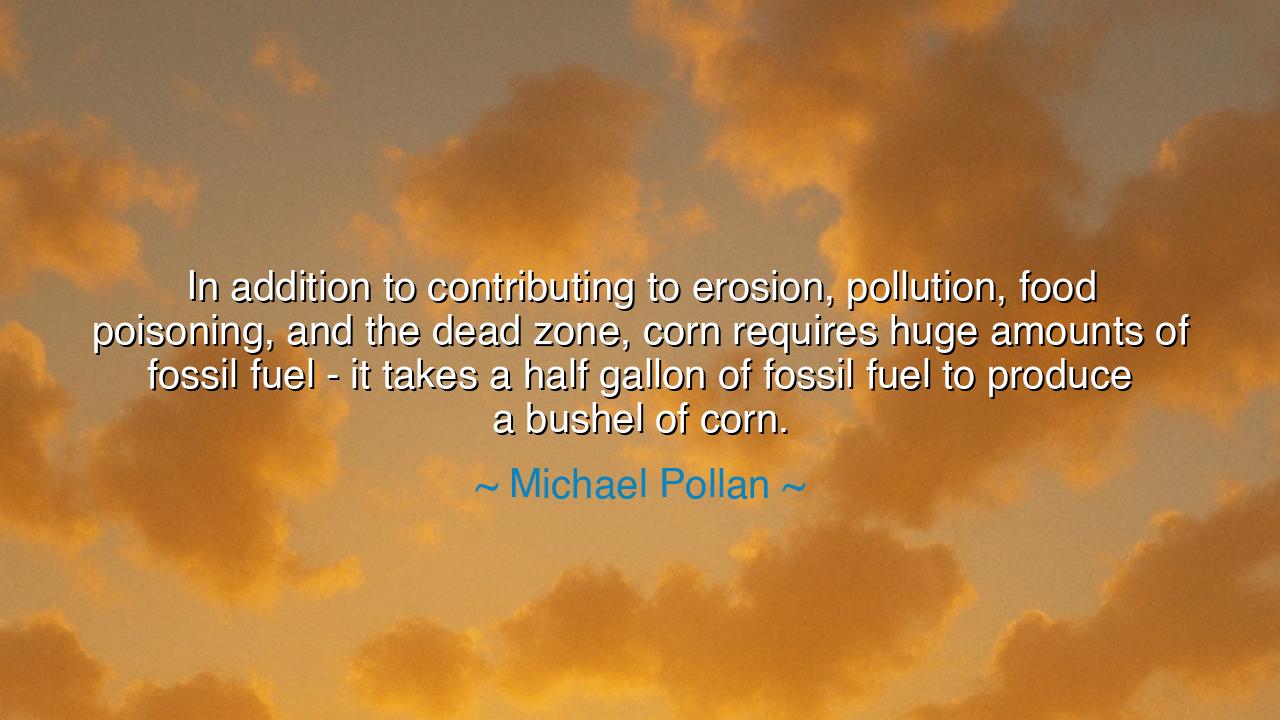
In addition to contributing to erosion, pollution, food
In addition to contributing to erosion, pollution, food poisoning, and the dead zone, corn requires huge amounts of fossil fuel - it takes a half gallon of fossil fuel to produce a bushel of corn.






In the councils of old, the elders warned that a feast taken on credit is a famine deferred. Michael Pollan’s charge—“In addition to contributing to erosion, pollution, food poisoning, and the dead zone, corn requires huge amounts of fossil fuel—it takes a half gallon of fossil fuel to produce a bushel of corn.”—sounds like such a warning. He does not condemn the golden grain that fed nations; he indicts the bargain we have struck with it in our age: an industrial monoculture that eats soil, drinks oil, and pays its debts downstream. The sentence is a ledger read aloud at dusk: topsoil lost, rivers clouded, bodies sickened, seas starved of breath—and beneath every entry, an IOU signed in diesel and gas.
First, the earth itself bears witness. Erosion is the quiet theft of centuries; a living skin scraped thin by bare rows and restless plows. Where roots do not hold and cover is not kept, rain runs like a thief, carrying the harvest of ages into ditches. The elders of the plains saw it once before—the Dust Bowl—when ambition outran stewardship and the horizon turned brown. Today, the same lesson returns in subtler dress: fields left naked through winter, slopes furrowed straight downhill, drainage racing instead of sinking. The soil remembers; it keeps the score in gullies and silted creeks.
Then the waters speak. Fertilizers and pesticides—necessary companions of vast, simplified acres—become pollution the moment they leave their appointed rows. They ride the veins of the continent to the sea, where their gift of nitrogen turns traitor, birthing algal blooms that die and draw down oxygen. Thus the dead zone in the Gulf: a summer kingdom where fish cannot breathe, shrimpers trail their nets through silence, and the river’s mouth tastes of regret. What began as green promise in the uplands ends as gray stillness at the shore.
Nor are our bodies untouched. The speed and scale demanded of corn invite shortcuts and hazards: feedlots thick with manure, processing lines that race the clock, kernels reshaped into syrups and fractions that stalk us in every aisle. From this abundance come episodes of food poisoning, and from this ubiquity come diets that fill yet do not nourish. The old blessing—“May your bread be your medicine”—is mocked when the staple is stripped, sweetened, and sold back to us in disguises.
At the root of the arithmetic lies energy. Machines till, plant, spray, harvest, dry, and haul; factories conjure fertilizers from air at great heat and pressure; trucks and trains move grain like armies. Pollan’s figure—a half gallon of fossil fuel for every bushel—is a parable of dependency: sunlight captured poorly and propped up by ancient sunlight from below. We have taught a summer crop to behave like a winter star, and the price is paid at the pump and in the sky.
Yet the story need not end in lament. There are fields where a different covenant holds: corn rotated with legumes and small grains; cover crops stitching the soil through winter; contour and buffer strips slowing water to a grateful drink; livestock returned to pasture rather than penned atop lagoons; nitrogen rationed by biology before it is bought by barrel. In such places, yields remain, fuel use falls, streams clear, and the land begins to purr like a well-tuned instrument. The difference is not magic; it is attention.
From this saying, take a clear lesson and a charge. Lesson: prosperity that bleeds the soil and floods the river is counterfeit. Charge: restore the balance by matching appetite to ecology. For farmers—plant covers every year, diversify rotations, pull back tillage, meter nitrogen to the crop’s true need, and use perennials or prairie strips where water runs fast. For merchants and makers—buy from regenerative acres; price in the cost of pollution avoided; shorten the journey from field to table. For households—choose whole foods over fractions, seasonal over shuttled, labels that name farms rather than factories; favor tortillas and polenta made from thoughtfully grown grain. For leaders—shift incentives from sheer bushels to living soil, clean water, and rural livelihoods that endure. Do these things, and the ledger changes: less oil per bushel, less erosion per rain, fewer blooms and fewer sirens, more life in the river and the sea. Then our children will inherit not a debt, but a field that pays its way in sunlight and mercy.






AAdministratorAdministrator
Welcome, honored guests. Please leave a comment, we will respond soon